Uncovering Genies: How does the overseas company aiming to create a 3D QQ Show achieve a valuation of 1 billion dollars?
Source: MetaverseHub
Recently, Genies completed a $150 million Series C funding round led by Silver Lake, with participation from Bond, NEA, and Tamarack Global, achieving a valuation of $1 billion.
Thus, another unicorn company has emerged in the metaverse space, and this funding will be used to hire more engineering talent to build a metaverse platform based on customizable avatars.
According to public information, Genies has completed 12 rounds of financing since its establishment, with this being the largest amount raised.
In January 2017, Genies completed a $250,000 funding round led by Joe Montana, with Al Dhow Capital participating, which was support received during Genies' early development.
Subsequently, Genies completed a Series A funding round and several venture capital investments, with a total funding amount of $42.8 million by May 2021 (excluding undisclosed amounts).
During this period, Genies also partnered with the well-known Japanese gaming company Bandai Namco, receiving a $3 million investment and launching a limited edition NFT series of digital gear.
In May 2021, Genies completed a $65 million Series B funding round, led by Bond, with participation from Coinbase Ventures, Foundation Capital, and others.
At the beginning of 2022, Genies secured two rounds of funding, one being the aforementioned Series C round, and the other an undisclosed investment from Disney CEO Robert Iger.
Although some people still believe that the metaverse is an uncertain future, with more and more internet giants and tech leaders entering the space, it may be time to reconsider the metaverse from a different perspective.
As the world's largest avatar company, Genies has become a new unicorn in this field thanks to the current wave of interest in the metaverse. So why has this company, which aims to create a 3D QQ Show, become the "new darling" of many investors and achieved such a high valuation? What are the underlying reasons?
Who is Genies?
Genies is a virtual avatar technology company founded in 2017, which has developed for nearly five years, co-founded by Akash Nigam, Evan Rosenbaum, Jake Adams, and Matt Geiger, and currently has over 100 employees.
Genies uses artificial intelligence to develop a customizable avatar system for users, allowing them to create virtual images based on personalized avatars and outfits.
One of Genies' significant features is its ability to track news from hundreds of media outlets, generating 10-15 expression templates daily based on these news stories and various holidays.
Once users create their virtual images on Genies, they can use the generated expressions on other social media platforms.
This personalized and fun custom expression has attracted countless trend-following young people, and when Genies launched, it garnered 680,000 user reservations.
In October 2020, Genies launched its own 3D avatar product and subsequently collaborated with many Western celebrities, such as Cardi B, Rihanna, and Justin Bieber. Celebrity teams can post promotional photos featuring virtual images on social media, and Genies gained significant attention through their influence.
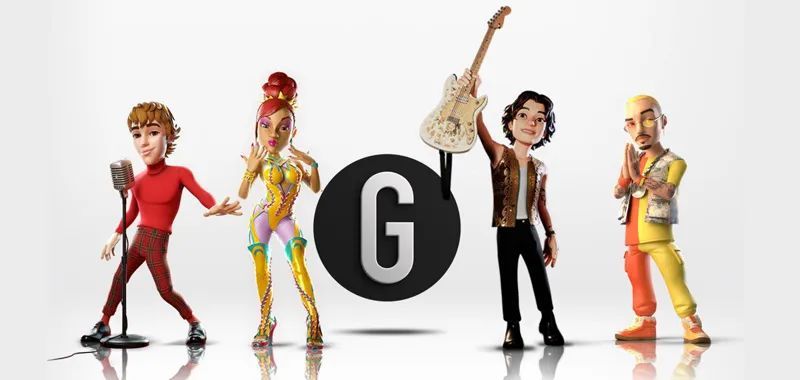
Genies' rapid rise attracted the attention of luxury brand Gucci, and after their collaboration, Genies allowed individual users to create their personalized virtual images and purchase digital clothing from the brand to dress their avatars, marking the beginning of Genies' transition from 2D to 3D using blockchain technology.
By launching its own 3D avatar SDK, users can create their native avatars and a series of metaverse fashion avatars, ultimately completing the creation of an expression avatar library and a true social experience, thus establishing a digital identity ecosystem.
Genies' CEO Akash Nigam believes, "This is an image that allows you to create anything you want, anything you can think of; it’s like a sculpture of your personality, not a sculpture of you as a real person."
More importantly, based on the virtual avatars created by Genies, creators have complete ownership and commercialization rights, allowing them to use them in any way they choose.
Genies not only allows users to showcase a true version of themselves through virtual images but also provides complete creative freedom. As one of the essential elements of the metaverse, Genies is undoubtedly one of the best ways to enter the metaverse.
What achievements has Genies made?
In its early days, Genies' products were somewhat similar to 2D virtual images like Snapchat's Bitmoji. However, as its products continuously upgraded and deepened collaborations with brands, Genies ultimately evolved into one of the largest virtual avatar companies in the world.
Genies launched in December 2017, receiving 680,000 user reservations and achieving a valuation of $100 million within three days.
In 2018, Genies released its first Genies SDK software development kit and invited Gucci to become its first global advertising partner.
Genies users can access the "Gucciwheel," allowing them to purchase and dress their virtual images in their favorite clothes, while Gucci employees can also use these virtual images to showcase their personal styles.
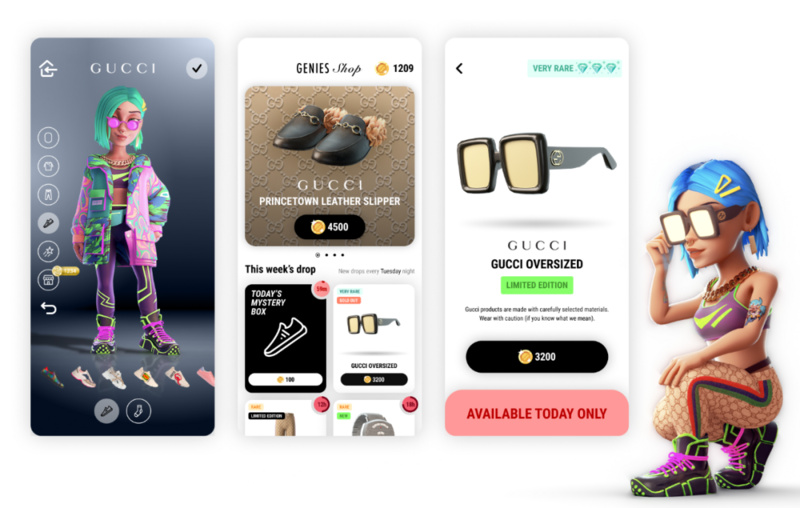
In the following two years, Genies continuously refined its social media attributes. In October 2020, it collaborated with Unity to build its 3D avatar world, using Unity Software's game engine to create 3D avatars for celebrities and the general market.
Genies released the Avatar and digital goods SDK, enabling users to create Genies avatars as GIFs and personalized stickers for use on their websites, apps, and other networks.
In November 2020, Genies partnered with Justin Bieber and Amazon Music to launch a promotional song for that year's Christmas. It also collaborated with Dapper Labs to plan the integration of Genies into the Flow blockchain.
Around the same time, Genies secured a $3 million investment from Bandai Namco for its expansion into Asia.
Before this, Genies launched Genies Membership, customizing avatars for celebrities, artists, idols, and athletes. Rihanna, iamcardib, JBALVIN, and OffsetYRN all launched their Genies avatars.
In February 2021, Genies made its first attempt at selling wearable digital goods, with a $500,000 wearable device by Mesut Özil selling out in ten minutes, allowing fans to collect and decorate their Genies avatars.
Shortly after, Genies partnered with OpenSea and collaborated with Shawn Mendes to launch an NFT.
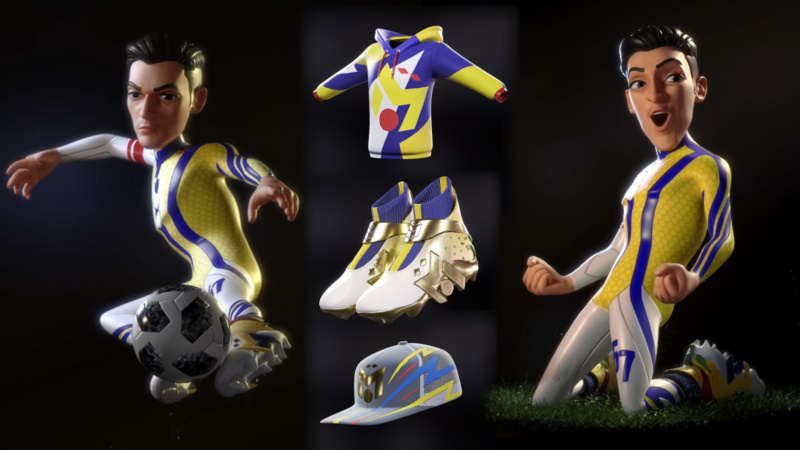
In April 2021, Genies launched its Discord channel to strengthen its connection with the community.
Subsequently, Genies released an app and a marketplace called Drop Shop, providing users with a personalized NFT avatar creation platform and collaborating with Dapper Labs to launch the NFT digital wearable marketplace Genies Marketplace.
During this period, Genies also expanded its Genies Membership program, collaborating with Jake Paul, Dove Cameron, and Trippie Redd, and partnering with the music group WMG to create avatars for their musicians.
At the same time, Genies partnered with Giphy, Facebook's online GIF database, to broaden the application scenarios for Genies avatars.
In 2021, Genies made more attempts to collaborate with celebrities and IPs. It partnered with Young Thug and GunnaGunna to launch the Skichallenge theme.
It collaborated with Pac-Man to launch a limited edition wearable NFT collection to celebrate Pac-Man's 41st anniversary.
Additionally, it continued to expand its Genies Membership landscape, collaborating with Migos, Russell Westbrook, Lolo Zouai, Jaden, NATTINATASHA, Xavi Simons, Amanda Nunes, Oliver Tree, WhaleShark_Pro, Marsai Martin, Joel Corry, KIM PETRAS, and Bo Han.
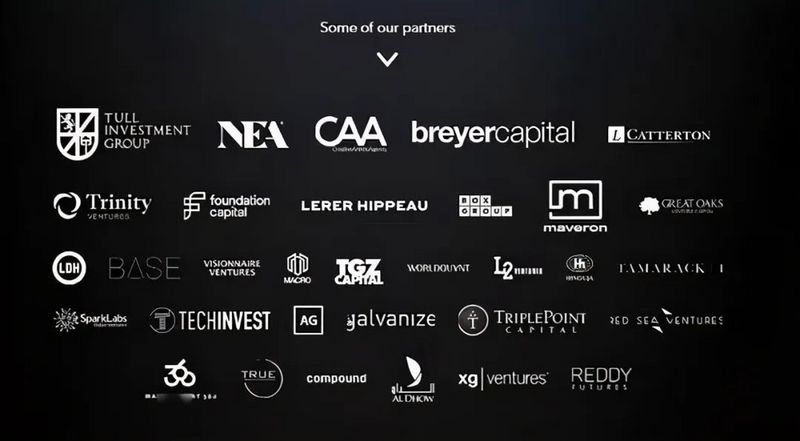
In October 2021, Genies collaborated with Decentraland for a metaverse carnival, providing avatars during a four-day celebration of music, culture, and creativity, along with related NFT airdrops.
In December 2021, Genies partnered with Universal Music Group, creating avatars for all Universal Music artists to prepare for further entry into Hollywood.
Almost simultaneously, Genies collaborated with Dapper Labs to launch its NFT marketplace "The Warehouse," distributing airdrops for creators to buy, sell, and trade all digital accessories for 3D avatars in Genies, which will be minted on the Flow blockchain.
At the beginning of 2022, it announced that each user has complete commercialization rights to their avatars and wearable devices, encouraging the trading and circulation of digital collectibles.
With more collaborations with celebrities like iann dior, Jadon Sancho, Green Bean, and Timmy Trumpet, "The Warehouse" launched series products like Oasis and Hyperpunk.
In February 2022, Genies launched Genies Creator OS, releasing UGC wearable documentation, allowing users to design and sell their unique digital goods in "The Warehouse."
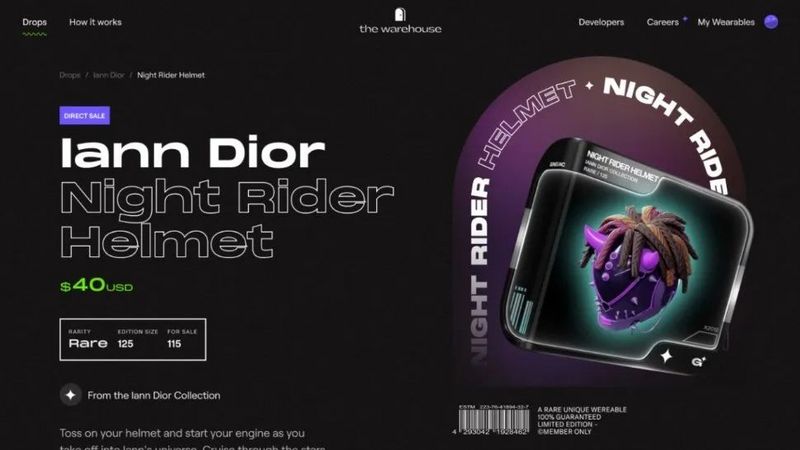
At this point, Genies has become exceptionally prominent.
In March 2022, Genies was named one of the best startup employers in the U.S. by Forbes and market research firm Statista. It was also recognized by Fast Company as one of the 10 most innovative social companies of 2022.
Former Disney CEO Robert Iger joined the Genies board and made a personal investment, making Genies a hot topic on Wall Street.
As it launched wearable devices themed for the Year of the Tiger to celebrate the Chinese New Year, Genies completed a $150 million Series C funding round led by Silver Lake, marking a strong start for 2022.
Genies prominently states on its official website, "your space, your rules."
Since its inception, Genies has rapidly developed, creating essential tools for building future avatars, and its high-precision virtual avatars provide ordinary people with a gateway to the metaverse.
We cannot hastily conclude that Genies is the most important virtual avatar solution provider globally, but there is no doubt that it will occupy a significant position in the field of virtual avatars.
What business opportunities has Genies identified?
Social interaction is the greatest human need and one of the largest application directions of the internet today, but current social interactions still rely mainly on avatars to represent us, communicating through text or voice.
Expressions between people are limited by the display methods provided by internet applications, and all our account information is controlled by internet giants.
However, in the future, the metaverse is a three-dimensional virtual world where we can have richer ways to express ourselves, and virtual avatars are the most direct means.
Virtual avatars are no longer limited to 2D images like avatars; they are a new 3D expression, allowing avatars in the virtual world to be adjusted in appearance and physique just like real people.
Moreover, independent outfits can be derived around virtual avatars, integrating with well-known offline brands, such as offering virtual hats from famous fashion brands for our avatars to wear.
Additionally, virtual avatars can provide richer interactive ways, allowing us to experience more genuine emotional feedback in metaverse interactions, akin to face-to-face interactions in reality.
More importantly, in a decentralized Web3 metaverse, the ownership of all virtual avatars and the series of virtual items derived from them belongs to the users.
Users will genuinely feel that this virtual avatar is themselves in the virtual world, believing they are living in the virtual world, rather than just playing some social games on a large internet platform.
Genies has recognized the future of the metaverse and understands the importance of virtual avatars in it, thus determining its mission to empower humanity to create their digital identity ecosystem.
On one hand, it provides users with avatar creation tools, allowing anyone to create and showcase their avatars and the NFT items that can be worn on them.
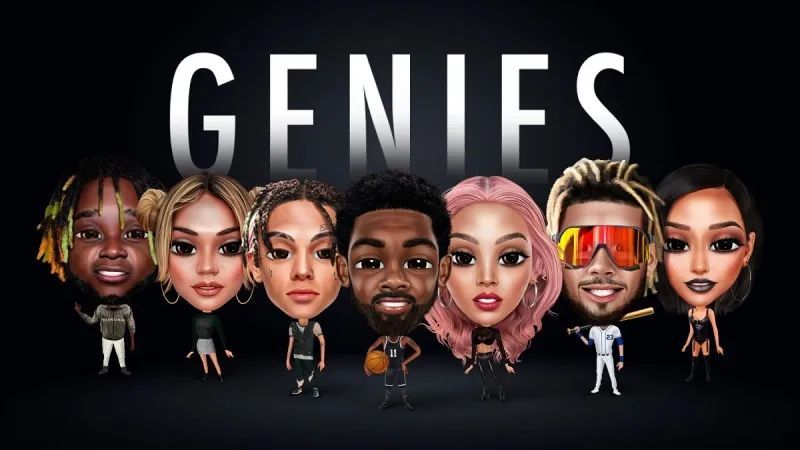
On the other hand, Genies will also launch tools for creating virtual worlds and providing interactive experiences, with users holding complete commercialization rights to all of these.
The work Genies is doing aims to ensure that people can gain true freedom upon entering the digital world, where everyone can control their identity in the digital realm, which is an essential element for the future metaverse.
Recently, news about financing for virtual avatars has been frequently released, and as a crucial part of the metaverse, virtual humans' performance in the capital market is particularly noteworthy.
On December 28, 2021, the metaverse avatar platform Ready Player Me, which allows users to explore the virtual world with a consistent virtual image, announced it had raised $13 million in Series A funding to expand its global team.
On January 26, 2022, IMVU secured a $35 million strategic investment, with investors including NetEase Capital and Structural Capital.
The IMVU app is a 3D virtual character social platform that offers various 3D virtual scenes, allowing users to create their own 3D virtual characters and make friends within the platform; users can take photos in different scenes and share them on social networks, while the platform also provides shopping features.
On February 21, 2022, AI + 3D virtual avatar assistant development company Soul Machines announced it had completed $70 million in Series B1 funding.
This round of funding will primarily be used to drive the growth of digital human/virtual avatar technology and the market, providing interactive methods for virtual platforms like the metaverse.
On April 8, 2022, Yingmou Technology (Shanghai) Co., Ltd. announced it had completed several million yuan in Pre-A round financing, with the funds continuing to be used for team building and the research and development of core technologies for digital humans, exploring more possibilities for digital human applications driven by intelligent technology.
Recent financing amounts have generally been quite high, indicating a clear emphasis from the capital market on this direction, but the ecological landscape for virtual humans has yet to form, and it is currently in a competitive phase of land-grabbing.
Can Genies' business model be replicated?
When we discuss whether Genies' business model can be replicated, we need to understand what Genies' business truly represents.
As mentioned earlier regarding digital identities in the metaverse, there is a simple logic that can be referenced.
In the early 2000s, when the internet was just becoming popular, why did platforms like ICQ (the world's first instant messaging software developed by the Israeli company Mirabilis in November 1996) and QQ (launched in 1999) become pioneers of this wave of connectivity? Because they solved a fundamental problem: replicating physical identities in the internet.
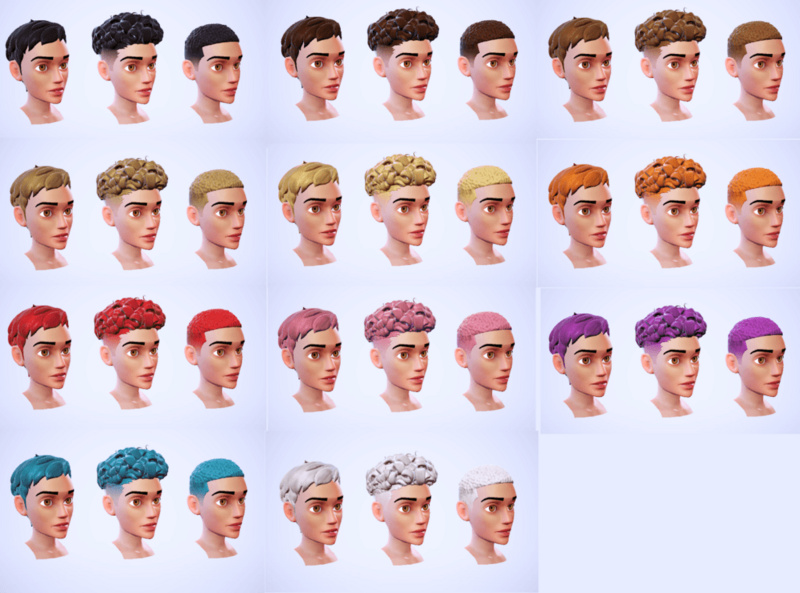
What does this mean? Before the internet, our communication could only be achieved through mail and phone (or pagers), and the birth of the internet provided the foundation for everyone to connect.
MSN and QQ, in addition to providing communication platforms, also established our identities on the internet through a string of characters or QQ numbers, thus solving the problem of "I am me" in the internet.
In the context of the metaverse, we also need a piece of information or character to confirm our identity in the metaverse.
But this time, we cannot settle for just a symbol or a string of numbers; we need a three-dimensional, visually recognizable character, which is the role of Genies or virtual humans.
Therefore, with this logic, when we look back at Genies' business model, it is not hard to realize that if there were ICQ overseas in the internet era, and QQ domestically.
Then similarly, now that there is a successful metaverse identity creation company like Genies overseas, perhaps a similar unicorn company will emerge domestically.
From a business model perspective, once digital identities are established, the development of the metaverse can usher in a period of vigorous growth, bringing forth more creative ideas, which is also a significant reason why Genies has garnered favor.
If the time machine effect exists, or if historical rhymes always hit the mark, then Genies may have arrived at a historical rhyme point, coincidentally this time the story unfolds on the other side of the Pacific, and we seem to be playing the role of followers once again.










